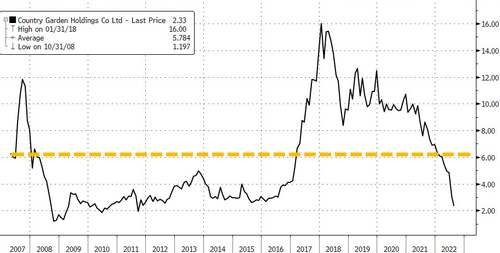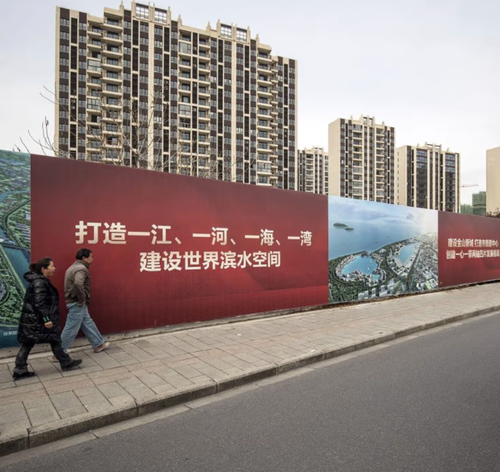China hit an ominous milestone this week as one of the largest property developers reported a 96% profit drop, blaming a "severe depression" in the real estate market where "only the fittest can survive," reported WSJ.
Garden Holdings Co.'s first-half earnings crashed the most since its 2007 listing in Hong Kong as the housing market crisis worsened. It said preliminary net profit collapsed from $2 billion to just $88 million in the first six months.
Alarm is spreading in China as the once robust property market is at risk of collapse. The Guangdong-based company warned demand is slipping and property values are sliding:
All these exert mounting pressure on all participants in the property market, which has slid rapidly into severe depression. The harsh business environment in which only the fittest can survive means even higher requirements for businesses' competitive strength."
On Aug. 15, Fitch Ratings and Moody's Investors Service slashed Country Garden's outstanding debt rating from investment grade to junk. What's different about this developer is that it focuses on low-income housing, where buyers have been more susceptible to financial troubles amid the economic slowdown.
Shares of Country Garden are down more than 66% this year, while most of its offshore bonds are trading south of 50 cents on the dollar.
China's housing market has been a major driver of growth over the last quarter century and is one of the biggest asset classes in the world, with a notional value of between $55 trillion and $60 trillion. Its size outpaces the capitalization of the US stock market.
Warning signs emerged last year when the second biggest developer, Evergrande, couldn't repay its offshore, dollar-denominated debt. It appears debt contagion has spread from Evergrande to not just Country Garden but dozens of other developers:
"More than 30 Chinese real-estate companies, including China Evergrande Group and Sunac China Holdings Ltd., have already defaulted on their international debt," WSJ said.
The bleak outlook for property markets came as zero-Covid lockdowns and snarled supply chains had strangled economic activity across the world's second-largest economy.
"The real estate market is undergoing a cruel and drastic reshuffling process," Midea Real Estate Holding Ltd., another Chinese developer, said, adding it would "forge ahead in a tough way."
China's deflating property bubble has also sparked discontent among households. There have been reports this summer that some homeowners have stopped paying mortgage payments on at least 100 projects in more than 50 cities because many who bought new construction units at the highs have seen values plunge, setting up for what appears to be a debt jubilee as non-payment could spread to the broader financial system as countless mortgages default.
There's reason to believe China's real estate crisis is far from over, as noted by Country Garden Chief Financial Officer Wu Bijun:
"The home market hasn't entirely bottomed out, and the sector's consolidation isn't over. Property sales nationwide still haven't stabilized."
A weakening economy could exacerbate things for property developers, and perhaps the reports of a national bailout fund to finance stalled real-estate projects is Beijing's attempt to keep the music going.
So what happens if China can't stop the economic hemorrhaging?
Taiwan's Foreign Minister Joseph Wu warned back in 2019 that if a slowdown in China gets too "serious," then "We need to prepare ourselves for the worst situation to come ... military conflict."



No comments:
Post a Comment